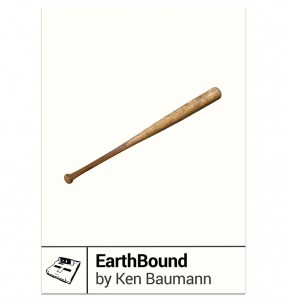Boss Fight Books
191 pages, $14.95
Reviewed by Kelsie Hahn
Ken Baumann’s EarthBound is the first release from Boss Fight Books, a press founded by Gabe Durham and Baumann to publish books that celebrate classic video games.
EarthBound the game is a quirky, funny, and often satirical role-playing game from Japan set in the U.S. In it, the hero Ness and his friend battle spiteful crows, hot cups of coffee, ramblin’ evil mushrooms, skate punks, and other assorted villains tainted by the evil influence of Giygas. The game was a massive launch in America in 1995 with lousy sales. But those wise enough, or lucky enough, to have purchased the game at its launch have loved and championed it. It is by turns funny and moving, irreverent and wise.
EarthBound the book is structured around Baumann’s account of re-playing the game as an adult, specifically in order to write a book about it. He savors the memories the game conjures, allowing the images, themes, and references to spark associations with his own life, all mixed with information about the game’s development, history, creators, and related social and philosophical commentary. Baumann lovingly recalls and captures the true American EarthBound experience, from the helpful guidebook and its scratch-and-sniff cards to the maddening quest for the rare Sword of Kings.
EarthBound the book wants to be like its namesake and inspiration, and in many ways it succeeds. Both are journeys of growth and self-discovery, regularly interrupted by side quests and non sequiturs. The reader/player roots for the main character, a regular guy who’s been given a task that might be too big for him. “The game’s like a monster that grows a new head each time I look away,” Baumann admits a quarter of the way through the book. “My attention feels prohibitively narrow — can I capture my experience with EarthBound, both past and present, in its entirety? Should I even try?”
The book best emulates the game’s sheer earnestness. Baumann wants the reader to like the game, and the book, and him. He’s funny and enthusiastic. He strives for wisdom. He captures the delight that was so unique and refreshing to the game he writes about. Baumann invites the reader not just into the weird, wild adventure of the game, but into the weird, wild adventure of writing the book as well.
EarthBound tries to be a little bit of everything: game summary, memoir, anthropology, cultural analysis, confessional. At some points it feels as though the book did grow too many heads. Some sections are too tangentially related. A few arguments stretch too thin. Lines and events that feel important fade away again, making the tension of the book less of a steady rise and more of a jagged dotted line.
EarthBound the game nominally works as the unifying hub of the incidents, quotes, memories, and interviews. But to speak the message as big as Baumann intends to, to grapple with the events that have made him the person he is today, the game alone is not enough. This of course, is the challenge of this venture and this structure and in Baumann’s approach to it. Games have neat causations and clear endings. Lives are messy and uncurated.
Though the connection between them may feel unstable at times, segments of the book shine individually. The emotional climax of the book is movingly written. In it, Baumann pairs a frightening, dangerous moment in his own life with the climax of the game. He captures both with emotion and vulnerability. Like Ness, he summons prayers from the future into the past. He invites the reader into the moment with him, but it’s because the reader hasn’t already joined him there. The moment is beautiful, but its beauty shines out suddenly, unexpectedly, rather than growing along with the narrative. That sense of climax is, of course, the challenge of structuring the book as jointed segments, rather than linearly.
This reviewer’s structural concerns aside, EarthBound the book is a pleasure to read. Long-time fans of the game will join in Baumann’s nostalgia for the classic RPG and dust off their Super Nintendo controllers. Newcomers will hunger to play the game in all its strange, rosy weirdness. Both will discover a book and a writer that are bold, wild, funny, smart. Just like the game that inspired them.
***
Kelsie Hahn’s reviews have appeared in Heavy Feather Review, Puerto del Sol, The Collagist, and Necessary Fiction. Her fiction chapbook Responsibility is forthcoming from Lit House Press. For more of her writing, visit http://kelsiehahn.weebly.com.
![[PANK]](https://pankmagazine.com/wp-content/themes/pank/assets/images/pank-logo-large.png)

